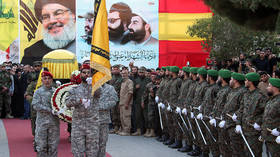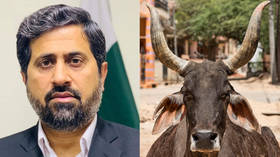Hezbollah’s ban in the UK is a badge of honour

Hezbollah has earned a formidable reputation for military prowess on the battlefield and political nous off it. It’s no wonder ‘they’ want to ban it.
Attaining to the status of rule of thumb is that whenever a military and/or political organization is proscribed in the West, prudence demands a closer look; this on the basis that in most cases (though not all) what ‘they’ deem worthy of being proscribed and banned is in truth worthy of support.
Take Hezbollah, for example, and the British government’s decision to criminalise the Shiite group’s political wing. Previously only the group’s military wing had been banned in the UK. Is there anyone left in the room that seriously believes this constitutes anything other than another feeble manifestation of the UK’s servile toadying to Washington?
Also on rt.com A gift for Bibi: Galloway slams ‘foolish’ UK decision to brand Hezbollah political wing ‘terrorists’In what stands as a monument to opportunism, the Trump administration has consistently placed Hezbollah in same terrorism box as Islamic State (IS, formerly ISIS) and Al-Qaeda, conveniently eliding the small detail that the Lebanese resistance and national liberation movement has done as much as, if not more than, any single military force in fighting and defeating IS and Al-Qaeda in Syria.
Author of ‘The Battle For Syria’, Christopher Phillips, writes, “Given Hezbollah’s reputation as the most impressive military force in the Arab world, [the group’s involvement in the conflict] sapped rebel morale and boosted the regime. By offering expertise that Assad lacked, such as light infantry and urban warfare expertise, training, or directing military tactics, from 2013 [Hezbollah] became a vital component of Assad’s forces and greatly shaped the conflict.”
The move to ban Hezbollah’s political wing in the UK combines with the organization’s consistent demonization in Washington as part of the ongoing neocon crusade against Iran. It is a crusade that attests to the Shia behemoth’s resolute stance in resistance to and defiance of US hegemony and its regional proxies, Israel and Saudi Arabia.
Joining Iran in what has come to be known as an axis of resistance in the region is Hezbollah in southern Lebanon, where it enjoys overwhelming support and allegiance, and Syria.
Hezbollah, it is worth remembering, is also an electoral force of note in Lebanon, playing a full and transparent part in the country’s politics. In fact the group’s legitimacy in Lebanon is not in doubt, reflected in its endorsement by the country’s Christian president, Michel Aoun, no less.
A proper accounting of Hezbollah requires a grasp of the organization’s roots as a child of Israeli militarism and aggression over the course of repeated military incursions and invasions into Lebanon by the Israel Defense Forces (IDF), stretching back to the late 1970s.
Veteran Middle East correspondent David Hirst, in his work ‘Beware Of Small States,’ delineates the factors responsible for the group’s birth in the mid-1980s, revealing that “Israel, with its invasion” [of southern Lebanon] supplied “the provocation, the anger, the turmoil, or, as Israel’s like-minded American friends, the neoconservatives, might have put it, the ‘constructive chaos’ out of which new orders grow.”
Confirming Hirst’s analysis are the words of Hezbollah leader Hassan Nasrallah himself, whom Hirst quotes, “Had the enemy [Israel] not taken this step, I don’t know whether something called Hizbullah (sic) would have been born.”
Hezbollah’s establishment in resistance to an apartheid state bears an historical comparison with the African National Congress (ANC) in South Africa. British Prime Minister Margaret Thatcher’s branding of the ANC as a terrorist organization in the 1980s is no surprise either, considering the British establishment’s long tradition of standing on the side of the oppressor against the oppressed.
Hezbollah is, then, the Middle East’s answer to the ANC; like its African counterpart born of apartheid, along with the militarism and aggression it spawns.
The group’s formidable military reputation was elevated to near legendary status during its short conflict against Israeli forces in 2006. Hezbollah is widely perceived to have out-thought and outfought its IDF adversary.
Former MI6 officer Alastair Crooke, in a comprehensive analysis of the conflict, revealed, “Hezbollah’s fighters proved to be dedicated and disciplined. Using intelligence assets to pinpoint Israeli infantry penetrations, they proved the equal of Israel’s best fighting units. In some cases, Israeli units were defeated on the field of battle, forced into sudden retreats or forced to rely on air cover to save elements from being overrun.”
Hezbollah’s victory over the IDF in 2006 mirrors the victory of Cuban forces against the forces of white apartheid South Africa at the Battle of Cuito Cuanavale in Angola between 1987-88.
Nelson Mandela, a totemic and towering symbol of the struggle against apartheid in South Africa, described the outcome of Cuito Cuanavale as “a historic turning point in the struggle for the total liberation of the region from racist rule and aggression.”
Though too soon to assert that Hezbollah’s victory over the apartheid forces of Israel in 2006 marked a similar historic turning point, it is impossible to argue that it went some way to demoralizing the Israeli military and political establishment, which hitherto operated on the basis of the invincibility of Israeli military power in the region, bolstered by its close alliance with Washington and other Western states, the UK among them.
Crooke says “Hezbollah’s military defeat of Israel [in 2006] was decisive, but its political defeat of the United States – which unquestioningly sided with Israel during the conflict and refused to bring it to an end – was catastrophic and has had a lasting impact on US prestige in the region.”
One man’s terrorist is another man’s freedom fighter, goes the well-worn truism, and is ineffably appropriate when it comes to the standing of Hezbollah.
Organized on the basis of non-sectarianism, the organization has been at the forefront of resistance to Islamic State and other Salafi-jihadi groups in the region, while enjoying a vaunted reputation as a positive force in Lebanon itself for its dedication to upholding the country’s sovereignty and dignity, defending it from Israeli aggression and militarism.
Taking all these factors into account, and seasoning them with Britain’s own regressive role in the region, Hezbollah's UK ban has to count as a badge of honor.
Like this story? Share it with a friend!
The statements, views and opinions expressed in this column are solely those of the author and do not necessarily represent those of RT.















